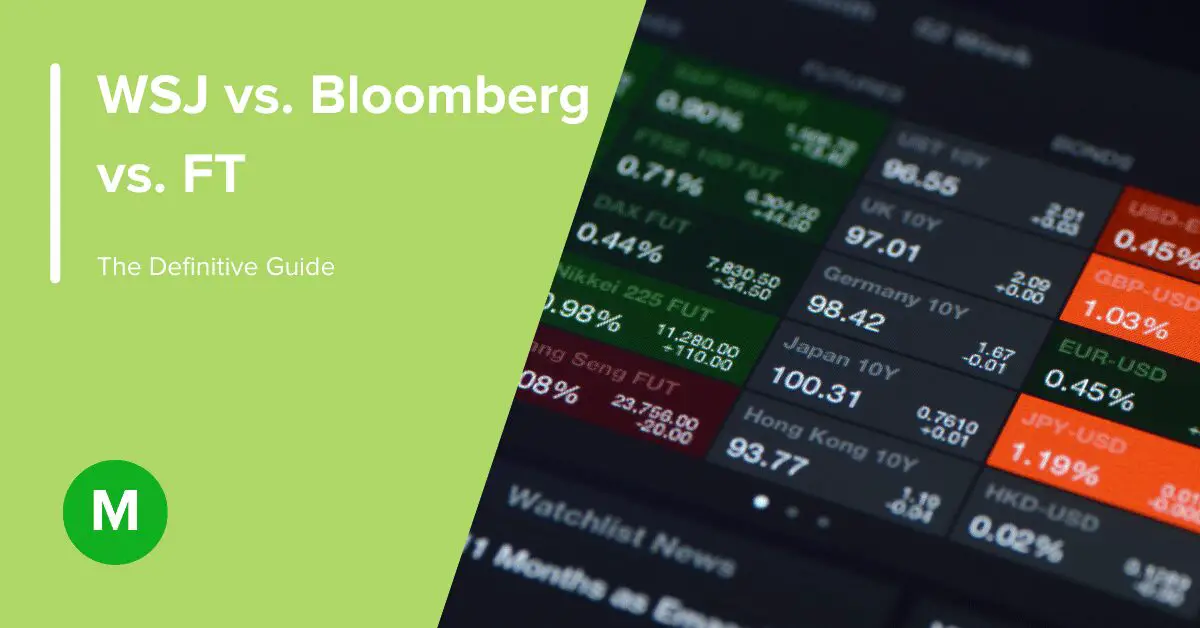WSJ vs. Bloomberg vs. FT (The Definitive Guide)
When looking at financial news sources, the world is your oyster.
There are many news outlets and reliable sources. The reputable ones come at a cost, so personal preference is ultimately the deciding factor.
What are you after? Company news, economic perspectives, or a broader set of some geopolitical and deeper thoughtful analysis?
Having worked as a financial journalist, I know well what real value people seek in a news source particularly for investing. Today, many believe it is not worth paying for Company results or fundamental economic and financial market analysis.
The actual value is in good content by experienced and seasoned journalists, something unique — a different perspective on events. Many develop personal favorites when it comes to journalists rather than loyal to a particular paper.
Key Points
- The Wall Street Journal and Bloomberg are better for business and finance-related news.
- Meanwhile, the Financial Times is better for political and economic news and analysis.
- The Wall Street Journal and Bloomberg generally have a more global perspective, while The Financial Times has a more European perspective by pure geographical association.
- The Wall Street Journal is generally more expensive. A monthly subscription will cost you roughly $40 per month, while Bloomberg costs $35 per month. The Financial Times, meanwhile, costs $40 per month.
- Prices are for their digital prints only. Physical prints usually cost more but can get cheaper if ordered in a bundle. Prices can change, and you are generally better off waiting for a deal that most of them seasonally offer.
- The Wall Street Journal has a circulation of about 2.2 million, while Bloomberg has a circulation of about 2 million. The Financial Times has a circulation of about 1.2 million.

Is WSJ or FT better?
That is a question of personal taste. It also depends on where you are based. Most people in Europe and the UK read the Financial Times, giving them a more European perspective while covering essential global aspects.
The WSJ gives you a US-centric view of the world with political opinions typical of domestic politics.
That does not make the WSJ worse than the FT — it has a different focus. For example, the FT would never write about the “Meaning of Donald Trump’s Hair,” while the WSJ did.
In addition, you have non-finance-related news.
Is Bloomberg better than WSJ?
Bloomberg is a widely known professional global financial news and information site covering relevant financial market news, and overall business newsbites. It’s very well known amongst professional circles for its outstanding financial market data and analysis.
Most professional people in the financial industry are users and very familiar with the Bloomberg terminal, which costs $24,000 per year. I do miss mine.
Bloomberg has entered the financial, business, and economic news arena with access to the masses only over the past few years. Bloomberg Businessweek includes in-depth insights from industry leaders.
Why do people pay for Bloomberg terminals?
People pay for Bloomberg terminals because they provide real-time financial data, news, and analytics. Bloomberg terminals are used by financial professionals to make informed decisions about investments.
The WSJ has been around for over a century and is a go-to source for business, finance, and political news for people in the US and globally. It has a more traditional news feel and covers many topics. Bloomberg has a more modern feel and is geared toward business and finance news. Both sites offer breaking news, analysis, opinion pieces, videos, and podcasts.
The WSJ is generally considered more reputable and has a higher circulation, while Bloomberg is newer and more innovative.
Is the NY Times or WSJ better?
The New York Times is better for general news, while the Wall Street Journal is better for business and finance-related information.
The New York Times is more affordable, with a subscription costing $15 per month, while the Wall Street Journal costs $38.99 per month.
The WSJ is a premium paper with a circulation of about 2.2 million, while the New York Times has a circulation of about 2.2 million.
Is it worth subscribing to WSJ?
If you are the type that wants to be updated daily about the US and global economy, then subscribing to the WSJ could make a lot of sense. Having splashed out on papers myself, one has to set time aside daily or at least a few times a week to read through some articles of interest thoroughly.
E-versions of the paper also make it possible to save or share some articles or snippets of interest through social media channels.
In addition, the WSJ offers not only breaking news, analysis, and opinion pieces but also videos and podcasts on their website, which could be helpful for someone who wants to get a deeper understanding of how the economy works.
The paper also has a section called “The Journal Report,” which gives readers an in-depth analysis of various industries.
Do students receive additional benefits from Wall Street Journal after they graduate?
There is no official word from the Wall Street Journal on this matter. However, it is possible that students may receive additional benefits, such as discounts on subscriptions, after they graduate.
The WSJ, as well as the FT, offer not only finance-related subjects. In addition, they offer reviews of Books, real estate coverage, and styles and sports section, which on weekends could be helpful to deflect from the financial market noise.
My personal favorite, for example, is the “How to spend it” section of the FT, which on weekends mostly makes me dream of things I could buy if I ever won that lottery.
Is the FT reliable?
The Financial Times is a reliable source of news.
The paper has a long history of accurate reporting, is considered one of the most respected financial publications in the world, and employs a large team of experienced journalists.
The Financial Times is also widely circulated, with copies sold in over 100 countries.
Who owns the WSJ, Bloomberg and the FT?
The Wall Street Journal is owned by the Dow Jones & Company, Inc a News Corp Subsidiary.
Bloomberg is owned by Bloomberg L.P.
The Financial Times is owned by Nikkei Inc.
Subscriptions and Pricing
All three publications come in roughly at similar subscription prices, but it is worth looking for special deals from time to time. In addition, all three price up different bundles, including the digital version and a printed edition.
In the case of Bloomberg, you also get access to podcasts, Bloomberg TV streaming, and their website.
The table below summarizes the current pricing and discounts for the respective digital formats (as of July 2022). If in doubt, it’s worth trialing as they offer varying trial periods for very affordable prices.
FT Subscription
Personal Subscription:
Wall Street Journal Subscription
Personal subscription:
Bloomberg News Subscription
Personal subscription:
Final thoughts
All three papers are reliable sources of financial news and information.
However, each paper has its focus and perspective.
The Wall Street Journal is better for US-centric politics, business and finance news, while Bloomberg is better for general finance-related information.
The Financial Times is a favorite for political and economic news and analysis outside the United States.
The Wall Street Journal and Bloomberg typically have a more global perspective, while The Financial Times has a more European view through geographical association.
Prices for all three news providers are relatively similar, so it is up to the reader which format, visuals, and general style is preferred.
Often, discounts are available for your news provider of choice, so keep a look out for those offers.
Over time, you will likely follow certain journalists you think are providing the most helpful information, thought pieces, and unique insights. In my experience, it is worth paying for these insights.







